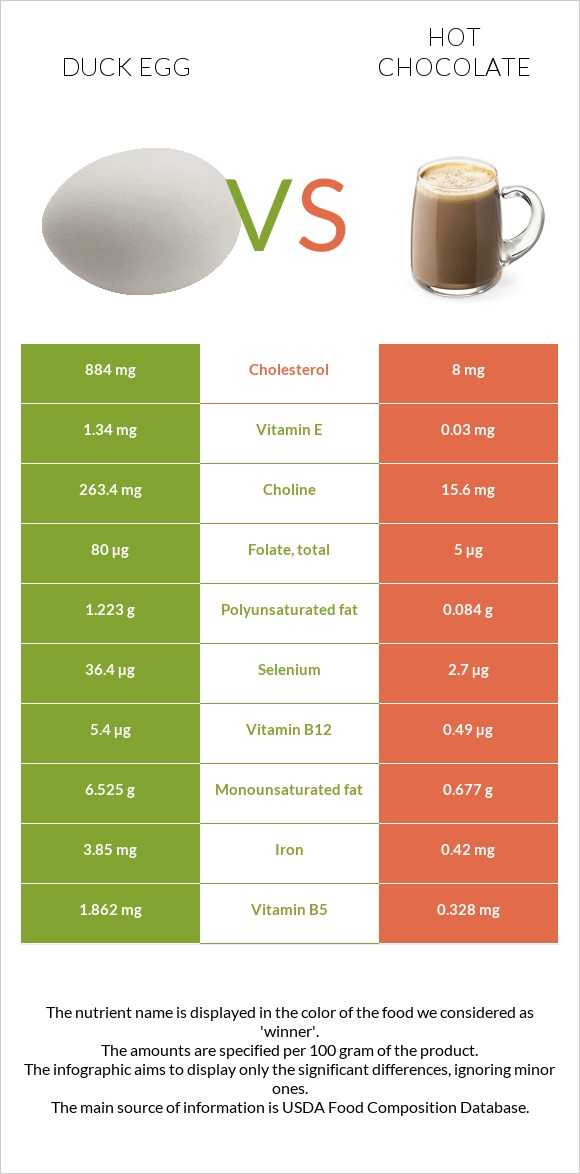Duck egg vs. Hot chocolate — In-Depth Nutrition Comparison
Compare
Summary of differences between duck eggs and hot chocolate
- Hot chocolate has less vitamin B12, selenium, choline, iron, vitamin B5, folate, vitamin B2, phosphorus, and vitamin B6 than duck eggs.
- Duck eggs cover your daily need for cholesterol, 292% more than hot chocolate.
- Duck eggs have 17 times more choline than hot chocolate. While duck eggs have 263.4mg of choline, hot chocolate has only 15.6mg.
- Hot chocolate has less cholesterol.
These are the specific foods used in this comparison Egg, duck, whole, fresh, raw and Milk, chocolate beverage, hot cocoa, homemade.
Infographic

Infographic link
Mineral Comparison
Mineral comparison score is based on the number of minerals by which one or the other food is richer. The "coverage" charts below show how much of the daily needs can be covered by 300 grams of the food.
| Contains more PotassiumPotassium | +12.7% |
| Contains more IronIron | +816.7% |
| Contains more ZincZinc | +123.8% |
| Contains more PhosphorusPhosphorus | +109.5% |
| Contains more ManganeseManganese | +192.3% |
| Contains more SeleniumSelenium | +1248.1% |
| Contains more MagnesiumMagnesium | +35.3% |
| Contains more CalciumCalcium | +78.1% |
| Contains more CopperCopper | +66.1% |
| Contains less SodiumSodium | -69.9% |
Vitamin Comparison
Vitamin comparison score is based on the number of vitamins by which one or the other food is richer. The "coverage" charts below show how much of the daily needs can be covered by 300 grams of the food.
| Contains more Vitamin AVitamin A | +280.4% |
| Contains more Vitamin EVitamin E | +4366.7% |
| Contains more Vitamin DVitamin D | +54.5% |
| Contains more Vitamin B1Vitamin B1 | +300% |
| Contains more Vitamin B2Vitamin B2 | +122% |
| Contains more Vitamin B3Vitamin B3 | +50.4% |
| Contains more Vitamin B5Vitamin B5 | +467.7% |
| Contains more Vitamin B6Vitamin B6 | +525% |
| Contains more Vitamin B12Vitamin B12 | +1002% |
| Contains more Vitamin KVitamin K | +100% |
| Contains more FolateFolate | +1500% |
| Contains more Vitamin CVitamin C | +∞% |
All nutrients comparison - raw data values
| Nutrient |  |
 |
DV% diff. |
| Cholesterol | 884mg | 8mg | 292% |
| Vitamin B12 | 5.4µg | 0.49µg | 205% |
| Selenium | 36.4µg | 2.7µg | 61% |
| Choline | 263.4mg | 15.6mg | 45% |
| Iron | 3.85mg | 0.42mg | 43% |
| Vitamin B5 | 1.862mg | 0.328mg | 31% |
| Protein | 12.81g | 3.52g | 19% |
| Folate | 80µg | 5µg | 19% |
| Fats | 13.77g | 2.34g | 18% |
| Vitamin B2 | 0.404mg | 0.182mg | 17% |
| Phosphorus | 220mg | 105mg | 16% |
| Vitamin A | 194µg | 51µg | 16% |
| Vitamin B6 | 0.25mg | 0.04mg | 16% |
| Monounsaturated fat | 6.525g | 0.677g | 15% |
| Vitamin B1 | 0.156mg | 0.039mg | 10% |
| Saturated fat | 3.681g | 1.431g | 10% |
| Vitamin E | 1.34mg | 0.03mg | 9% |
| Polyunsaturated fat | 1.223g | 0.084g | 8% |
| Zinc | 1.41mg | 0.63mg | 7% |
| Calories | 185kcal | 77kcal | 5% |
| Calcium | 64mg | 114mg | 5% |
| Copper | 0.062mg | 0.103mg | 5% |
| Fiber | 0g | 1g | 4% |
| Sodium | 146mg | 44mg | 4% |
| Carbs | 1.45g | 10.74g | 3% |
| Vitamin D | 69 IU | 45 IU | 3% |
| Vitamin D | 1.7µg | 1.1µg | 3% |
| Magnesium | 17mg | 23mg | 1% |
| Potassium | 222mg | 197mg | 1% |
| Manganese | 0.038mg | 0.013mg | 1% |
| Caffeine | 0mg | 2mg | 1% |
| Vitamin C | 0mg | 0.2mg | 0% |
| Net carbs | 1.45g | 9.74g | N/A |
| Sugar | 0.93g | 9.66g | N/A |
| Vitamin B3 | 0.2mg | 0.133mg | 0% |
| Vitamin K | 0.4µg | 0.2µg | 0% |
| Trans fat | 0.078g | N/A | |
| Tryptophan | 0.26mg | 0.037mg | 0% |
| Threonine | 0.736mg | 0.095mg | 0% |
| Isoleucine | 0.598mg | 0.169mg | 0% |
| Leucine | 1.097mg | 0.305mg | 0% |
| Lysine | 0.951mg | 0.215mg | 0% |
| Methionine | 0.576mg | 0.076mg | 0% |
| Phenylalanine | 0.84mg | 0.15mg | 0% |
| Valine | 0.885mg | 0.201mg | 0% |
| Histidine | 0.32mg | 0.067mg | 0% |
| Fructose | 0.01g | 0% |
Macronutrient Comparison
Macronutrient breakdown side-by-side comparison
Protein:
12.81 g
Fats:
13.77 g
Carbs:
1.45 g
Water:
70.83 g
Other:
1.14 g
Protein:
3.52 g
Fats:
2.34 g
Carbs:
10.74 g
Water:
82.45 g
Other:
0.95 g
| Contains more ProteinProtein | +263.9% |
| Contains more FatsFats | +488.5% |
| Contains more OtherOther | +20% |
| Contains more CarbsCarbs | +640.7% |
| Contains more WaterWater | +16.4% |
Fat Type Comparison
Fat type breakdown side-by-side comparison
Saturated fat:
Sat. Fat
3.681 g
Monounsaturated fat:
Mono. Fat
6.525 g
Polyunsaturated fat:
Poly. Fat
1.223 g
Saturated fat:
Sat. Fat
1.431 g
Monounsaturated fat:
Mono. Fat
0.677 g
Polyunsaturated fat:
Poly. Fat
0.084 g
| Contains more Mono. FatMonounsaturated fat | +863.8% |
| Contains more Poly. FatPolyunsaturated fat | +1356% |
| Contains less Sat. FatSaturated fat | -61.1% |





